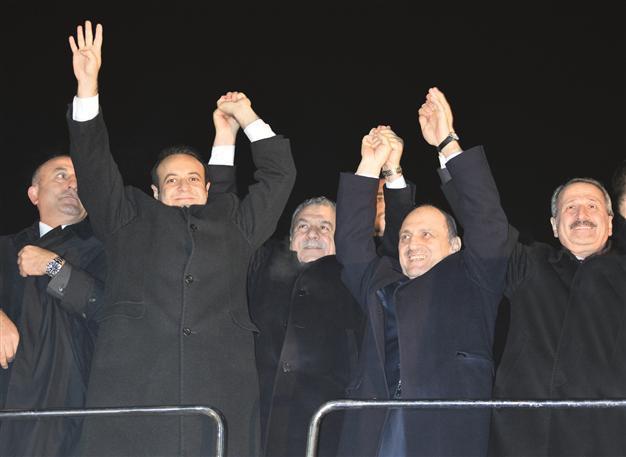HDP resigns from Turkish graft panel over media ban
ANKARA

Parliament decided to establish an investigation commission to probe former ministers Erdoğan Bayraktar, Egemen Bağış, Zafer Çağlayan and Muammer Güler on May 5. HÜRRİYET photo
No justification for a publication ban on proceedings at a parliamentary corruption commission mollified Turkey’s opposition parties, with the Peoples’ Democratic Party (HDP) announcing that it was quitting the panel in protest.The parliamentary commission has not worked on “sound ground” so far as many details have been withheld from the review of the opposition parties, Pervin Buldan, the deputy parliamentary group chair of the HDP, told reporters at a press conference yesterday.
The testimonies of the four former ministers at the heart of the affair were likely to be subject to a “fait accompli,” Buldan said.
“At the current stage, it is obvious that this commission has drifted apart from being ‘an investigation commission,’ and turned into ‘a political commission’ and that the outcome from here will transform into a whitewash,” she said.
Three separate appeals by main opposition deputies have been filed to a higher court for a lifting of the ban, as they argued that the request for a gag order and the ban itself were against the European Convention on Human Rights in addition to the Constitution, the Press Law and the Parliament’s Internal Regulations.
The main opposition Republican People’s Party (CHP) also asked for the resignation of the chair of the parliamentary commission tasked with the inquiry, Hakkı Köylü of the ruling Justice and Development Party (AKP), who submitted the request for the ban.
Buldan said the ban requested by Köylü set a “concrete example” that the commission process would not be conducted transparently.
“Due to all of these reasons, and as a requirement of the responsibility that we have shouldered and of the democratic opposition, from now on, there is no reason to remain at the commission. We want to announce to the entire public that we have withdrawn from the commission as of today in order not to stand by this whitewashing process,” she said.
Earlier in the day, Justice Minister Bekir Bozdağ defended the ban, suggesting that it was aimed at preventing the defamation of the defendants.
“The investigations need to be conducted by abiding by the right of people not to be defamed. One of the most important reasons of the secrecy is this, protecting the right not to be defamed. On the other hand, it is also for facilitating the healthy gathering of evidence,” Bozdağ told reporters.
A request for the ban was initiated by the parliamentary commission tasked with the inquiry and filed to the Ankara Chief Prosecutor’s Office on Nov. 21, asking for a ban that will last until Dec. 27. The ban was announced late Nov. 25.
All four parties in Parliament were being represented on the commission according to the proportionate number of seats they hold in the legislature. The AKP therefore holds a majority in the 15-member commission with nine seats, the main opposition CHP holds four seats and the Nationalist Movement Party (MHP) and the HDP each held one seat.
Parliament decided to establish an investigation commission to probe former ministers Erdoğan Bayraktar, Egemen Bağış, Zafer Çağlayan and Muammer Güler on May 5, after deliberations between political parties.
The four ministers resigned from Cabinet after a huge graft operation highlighted their relations with Iranian-origin businessman Reza Zarrab, who allegedly paid them a number of bribes over the last few years. Along with Zarrab, former Halkbank chief executive Süleyman Aslan is among the suspects of the corruption probe.
















